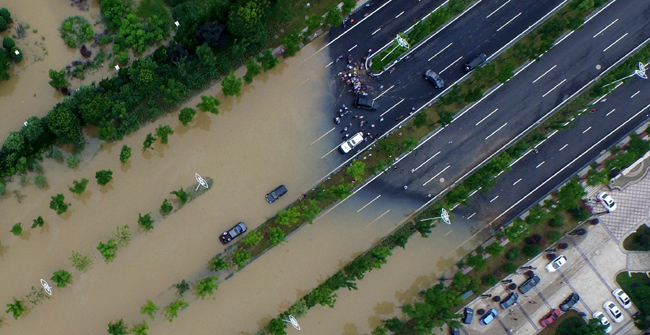Iran deal to pressure DPRK's nuke program: Seoul
Updated: 2015-07-15 21:30
(Xinhua)
|
|||||||||||
SEOUL -- Top policymaker in charge of inter-Korean relations in the Republic of Korea (ROK) said Tuesday that the nuclear deal sealed between Iran and six world powers would have a pressuring effect on the Democratic People's Republic of Korea (DPRK)'s nuclear program.
"The conclusion on the negotiations would have a pressuring effect on DPRK," Unification Minister Hong Yong-pyo told foreign correspondents in Seoul.
Iran and six major powers of the world, China, Britain, France, Russia, the United States and Germany, reached a historic agreement on the Islamic republic's nuclear program in return for the lifting of sanctions that hampered the Iranian economy.
The Iran nuclear deal would not result in the launch of fresh negotiations on the DPRK's nuclear program given the different technical level of nuclear development between Tehran and Pyongyang, Hong said, noting that those were the widespread opinion among experts.
The minister said South Korea would help the DPRK "make a right choice" on its nuclear program.
The top government official on DPRK policy heralded a less rigid attitude toward its northern neighbor. Hong said South Korea "does not necessarily" set the DPRK's denuclearization as an absolute precondition for improved ties.
Even before the denuclearization, the ROK will continue private-level exchange and cooperation to lay ground for the reunification of the two sides and restore the family bond between people, the minister said.
Hong said the ROK's large-scale investment, like infrastructure development in the DPRK, has been restricted under the UN economic sanctions, noting that if the DPRK launches the denuclearization process, the country can support such development and encourage investments from the international community.
The minister also commented on the lifting of the so-called May 24 sanctions, imposed in 2010 by the ROK against the DPRK after the Cheonan warship sinking that claimed 46 lives of South Korean soldiers.
"The government does not necessarily demand DPRK's apology (for the battleship sinking incident) first to resolve all issues," Hong said, adding that all inter-Korean issues should be resolved "through dialogue."
The May 24 measures, which ban all inter-Korean economic cooperation except the Kaesong industrial complex, came after the South Korean Navy corvette Cheonan sank in waters near the disputed maritime border in March 2010.
Seoul claimed that its battleship was sunken by the DPRK's torpedo attack, but Pyongyang has repeatedly denied its involvement. The ROK had maintained a position that the sanctions would not be lifted unless Pyongyang takes responsible action.
Hong urged the DPRK to come out to the dialogue table to resolve all issues, including the sanctions, noting that the May 24 sanctions were not meant to block trade between the two sides, but to develop inter-Korean ties in a stable way over the long run.
Related Stories
Iran's nuclear program shifts from confrontation to scientific activities: FM 2015-07-15 19:44
China 'constructive' on Iran nuclear deal 2015-07-15 11:20
Iranian nuclear deal set to increase trade with China 2015-07-15 07:59
Backgrounder: China's stance on Iran nuclear issue 2015-07-14 20:43
Today's Top News
China posts 7% GDP growth rate in Q2
Greek PM defends choice of harsh debt deal rather than Grexit
Three-day forum in Zhanjiang to launch 'online Silk Road'
UK restricts students' right to work
Housing costs are forcing out young generation
Stocks tumble 3% despite positive economic data
Little Pluto bigger than scientists thought as flyby looms
Iran, big powers clinch landmark nuclear deal
Hot Topics
Lunar probe , China growth forecasts, Emission rules get tougher, China seen through 'colored lens', International board,
Editor's Picks

|

|

|

|

|

|






